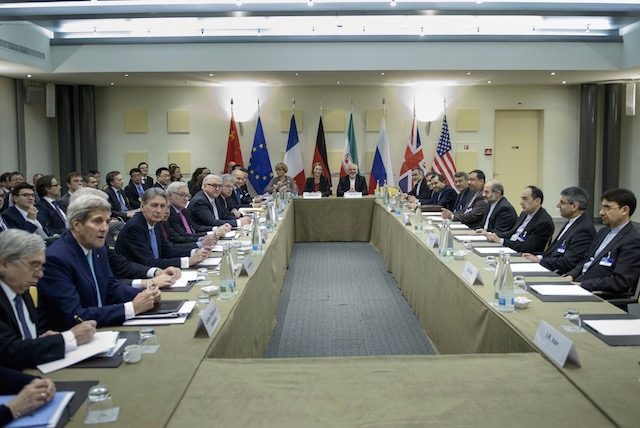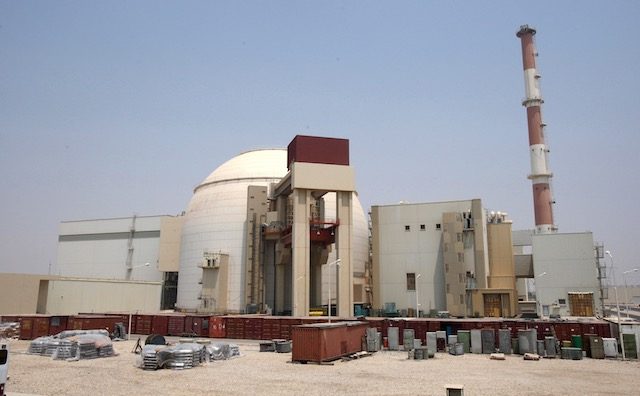SUMMARY
This is AI generated summarization, which may have errors. For context, always refer to the full article.

LAUSANNE, Switzerland – Marathon talks aimed at stopping Iran from acquiring nuclear weapons went into a final nail-biting day Tuesday, March 31, with Russia saying the chances were “high” of reaching a historic framework deal by midnight.
Russian Foreign Minister Sergei Lavrov was rushing back to the Swiss city of Lausanne to “take part in the final part of the ministerial meeting of the six powers.”
“Chances are high,” Lavrov told a press conference in Moscow.
“The prospects of this round of talks are not bad, even good I would say,” he added.
An army of technical and sanctions experts had worked into the early hours Tuesday, exchanging documents to form the basis of an accord.
The two sides hope to seal a political framework aimed at ending a nuclear standoff that has been threatening to escalate dangerously for 12 years.
They would have until June 30 to flesh it out with annexes.
US Secretary of State John Kerry, in Lausanne since Wednesday, March 25, in the latest in a series of meetings around the world with his Iranian counterpart Mohammad Javad Zarif, said late Monday, March 30, there “still remain some difficult issues”.
A meeting between Kerry and his counterparts from the other 5 powers began shortly after 7 am local time (0500 GMT).
They were joined later by Zarif and other members of the Iranian nuclear team, including nuclear chief Ali Akbar Salehi, for a full session which lasted about 40 minutes.
Early warning

The threat of new US sanctions, and pressure on Iranian President Hassan Rouhani from domestic hardliners overs his attempts at rapprochement with the West, would seem to rule out extending the talks yet again.
But the negotiations still hung in the balance Tuesday, as uncertainty reigned whether a deal could be reached by midnight (2200 GMT).
The stakes are high, with fears that failure to reach a deal may set the United States on a road to military action to thwart Iran’s nuclear drive.
Israel has also upped the pressure against what it calls a “dangerous” deal, which it fears could embolden Iranian regional ambitions.
Late Monday, Obama borrowed the words of his predecessor John F. Kennedy saying: “Let us never negotiate out of fear, but let us never fear to negotiate.”
Under the deal, the powers want Iran to scale back its nuclear program to give the world ample notice of any dash to make the bomb by extending the so-called “breakout” time.
In return, the Islamic republic, which denies wanting atomic weapons, is demanding the lifting of sanctions that have strangled its economy.
Some areas, including the future size of Iran’s uranium enrichment capacity – a process for making nuclear fuel but also the core of an atomic bomb – appear tentatively sewn up.
But the two sides still appear wide apart on other areas, including what to do with Iran’s stockpiles of nuclear material and the pace at which sanctions would be eased.
The six powers negotiating with Iran are only prepared to suspend sanctions, not terminate them, in order to be able to put them back into place if Tehran violates the deal.
Other tricky issues include the duration of any accord, with Iran resisting demands by the powers to submit to ultra-tight inspections by the UN atomic watchdog for at least a decade.
The global powers are also wary of Iran’s desire to continue researching and developing newer centrifuge machines that would enable Iran to process nuclear material more quickly.
With all eyes focused on Tuesday’s deadline, acting State Department spokeswoman Marie Harf said she could not predict what would happen if the outlines of a deal were not agreed in time.
“Obviously we always are planning for contingencies,” she told reporters, adding: “We will have to take a very hard look at where we are and we will have to decide what happens next.” – Simon Sturdee and Jo Biddle, AFP / Rappler.com
Add a comment
How does this make you feel?
There are no comments yet. Add your comment to start the conversation.